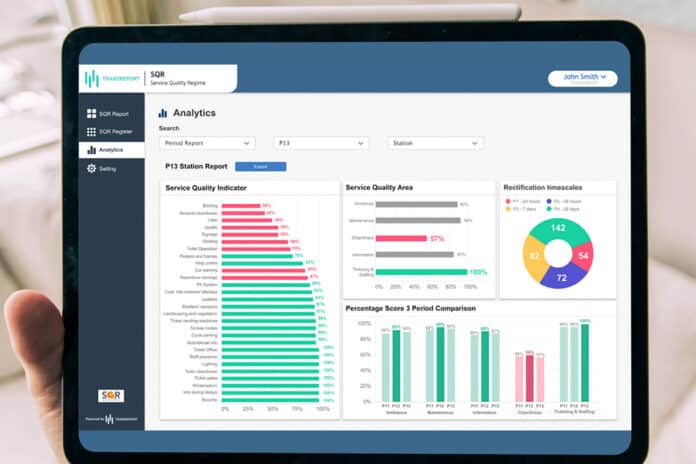In this article written for Rail Business Daily, Transreport and West Midlands Trains write about how the collaboration transformed the major train operator
When the Department for Transport (DfT) first introduced the new Service Quality Regime (SQR) in 2018, West Midlands Trains (WMT) struggled to keep up with requirements to tackle faults within set time periods, so they turned to our specialists, at Transreport, to help.
WMT needed centralised data that all their teams could access – from cleaning and maintenance teams to engineers and station managers. At the time, fault rectifications were being managed via ever-growing email threads, alongside separate Rolling Stock Asset Maintenance Management systems and Computer Aided Facilities Management systems that didn’t connect with one another. Resources were reactive, waiting for information, rather than proactively intervening and undertaking rectifications.
Nathan Johnson, customer strategy insight manager for WMT, asked our team to provide an integrative, flexible SQR system that could streamline SQR rectifications, improving customer experience and leading to real financial benefits for WMT.
Working alongside our client, we implemented a custom-built rail industry specific system that included a centralised data hub, bespoke real-time reporting aligned with DfT requirements and rectification performance monitoring. A key capability that the Transreport SQR system provided is the ability to integrate a multitude of systems being used within the industry, removing a lot of the manual recording and dual reporting, meaning an SQR failure is reported once and automatically shared with additional systems.
Nathan said: “Before the Transreport SQR system, we had a six-person triage team just to deal with SQR issues, with everything being managed via email and lots of separate reporting systems. It was a really intense process that was very laborious, open to a lot of errors, and it quickly became overwhelming. We were missing things that hadn’t been emailed properly, or emailed within the right timescale, and it was a constant battle from start to finish.”
“Going forward, I think it’s safe to say that having the Transreport SQR system in place allows us to actually have a chance at receiving the financial rewards on offer from the DfT for meeting the SQR benchmarks. Before this, we had no hope.”
WMT estimates that the number of rectifications being completed has risen by 30% since adopting the new Transreport SQR system, while SQR scores are an average of 25% higher. WMT has also been able to move its triage team into other areas of the business, reducing the need for new hires. Working together with WMT for 4 years, Transreport have continually innovated their SQR system to exceed all anticipated SQR requirements of the rail industry. Now the Transreport SQR system is being used by additional train operators, who all benefit from the innovation-led and collaborative approach.
Nathan added: “One of our station managers had stations that were scoring really poorly in SQR, but with this new system, we were able to see that this manager had the highest rectification rates out of anyone. Even though he had more failures to deal with, he was actually the best at doing something about them and rectifying them – before Transreport SQR, we never had the ability to look at rectification figures. It’s been a massive godsend in terms of increasing morale and collaboration between individuals and teams.”
Read the full case study here or contact hello@transreport.co.uk to understand how many additional train operators are benefiting from using the Transreport SQR.
Photo credit: Transreport



































 0113 2082620
0113 2082620 info@railbusinessdaily.com
info@railbusinessdaily.com 15 Mariner Court, Wakefield WF4 3FL
15 Mariner Court, Wakefield WF4 3FL

